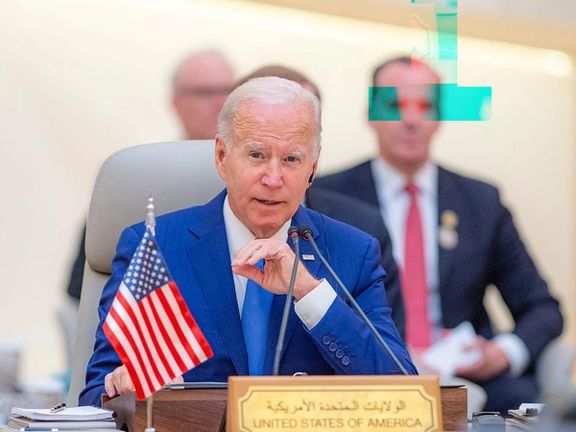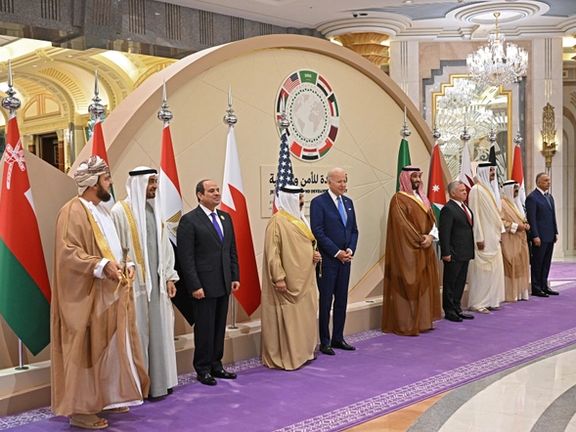In Saudi, Biden Sees ‘Complex Challenges’ As Putin Prepares Iran Trip

President Biden said Saturday that he will not leave the Middle East to Russia, China and Iran - adding focus to this week’s Tehran visit of President Putin.

President Biden said Saturday that he will not leave the Middle East to Russia, China and Iran - adding focus to this week’s Tehran visit of President Putin.
The United States’ release of satellite imagery Saturday showing Russian officers in Iran in June and July reviewing drones (unmanned aerial vehicles, UAVs) reflects Washington’s disquiet over the Iran-Russia relationship. Jake Sullivan, the US National Security Adviser, said last Monday that Tehran planned to supply “several hundred UAVs, including weapons-capable UAVs, on an expedited timeline.”
But Washington is also uneasy with the continuing Russia ties of both Saudi Arabia, which coordinates oil supplies with Moscow through Opec+, and the United Arab Emirates, which has become a haven for Russian money. Israel too has resisted US-led efforts to impose sanctions on Moscow.
“The United States is going to remain an active engaged partner in the Middle East as the world grows more competitive, and the challenges we face more complex,” Joe Biden said at the summit of nine Arab states in Jeddah, Saudi Arabia. “It’s only becoming clear to me how closely interwoven America’s interests are with the successes of the Middle East…We will not walk away and leave a vacuum to be filled by China, Russia or Iran.”
Biden repeated that the US would not allow Tehran to acquire a nuclear weapon, while his expressed preference for diplomacy came with a commitment not to deploy US forces. “Today, I’m proud to be able to say that the era of land wars in the region, wars involving huge numbers of American forces, is not underway,” he said.
The summit began with some Arab leaders concerned over Washington’s commitment to the region, especially since the chaotic withdrawal from Afghanistan last summer after a two-decade military presence. All hedge in one way or another. As well as coordinating global oil supplies with Russia, Riyadh has around $65 billion annual trade with China, and has since last year opened dialogue with Iran to reduce tensions.

Saudi Arabian Foreign Minister Prince Faisal bin Farhan Al Saud said Saturday he was unaware of any discussions on a Gulf-Israeli defense alliance, which some have speculated as the logical outcome of air-defense cooperation under US supervision.
‘Much diminished president'
Prince Turki Al-Faisal, a former Saudi intelligence chief and ambassador to the US, gave on US television Friday a withering assessment of Biden as a “much diminished president.” Saudi state media made light of Biden’s words at the summit Saturday over human rights and highlighted remarks from Crown Prince Mohammed bin Salman pointing to US hypocrisy over Jamal Khashoggi, murdered by the Saudis in 2018, given its own treatment of detainees in Iraq.
In another meeting, Biden invited Sheikh Mohammed bin Zayed Al Nahyan, president of the United Arab Emirates, to visit the US – two days after reportedly the UAE July 14 arrested Asim Ghafoor, Khashoggi’s lawyer, while in transit in Dubai.
Biden’s differences with the Saudis over Iran were smoothed over. A joint statement noted Biden’s commitment to “supporting Saudi Arabia’s security and defense” and committed the two sides to “further deter Iran’s interference in the internal affairs of other countries, its support for terrorism through its armed proxies, and its efforts to destabilize the security and stability of the region.”
JCPOA or tougher action?
But while the statement “stressed the importance of preventing Iran from acquiring a nuclear weapon” it made no reference to the 2015 Iran nuclear deal (the JCPOA, Joint Comprehensive Plan of Action), which Biden remains committed to restoring in the face of Saudi opposition. Differences between Biden and the Israeli leaders over the need for tougher action against Iran broke through displays of mutual congratulations earlier in the week when the US president was in Israel.
Putin’s visit to Tehran, due Tuesday, will see a trilateral meeting with Turkish president Recep Tayyip Erdogan. While Syria will be high on the agenda – under the ‘Astana format’ of the three countries – Erdogan has also been active in mediating between Russia and Ukraine.
Speaking Friday by phone with his Ukrainian counterpart Dymytro Kuleba, Iranian foreign minister Hossein Amir-Abdollahian reportedly expressed “opposition to Russia’s attack on Ukraine” in what appeared a shift in Tehran’s language if only for public consumption. There are also hopes in Tehran that Putin can offer assurances over Russian grain supplies disrupted by the Ukraine crisis.